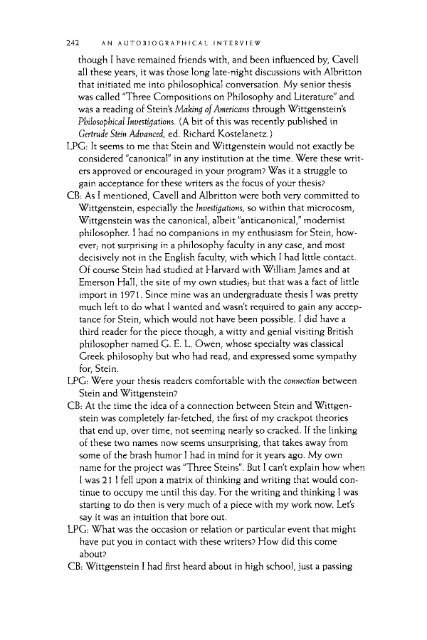My Way_ Speeches and Poems - Charles Bernstein
My Way_ Speeches and Poems - Charles Bernstein
My Way_ Speeches and Poems - Charles Bernstein
Create successful ePaper yourself
Turn your PDF publications into a flip-book with our unique Google optimized e-Paper software.
242 A N AUT 0 B lOG RAP H I CAL I NT E R V lEW<br />
though I have remained friends with, <strong>and</strong> been influenced by, Cavell<br />
all these years, it was those long late-night discussions with Albritton<br />
that initiated me into philosophical conversation. <strong>My</strong> senior thesis<br />
was called "Three Compositions on Philosophy <strong>and</strong> Literature" <strong>and</strong><br />
was a reading of Stein's Making of Americans through Wittgenstein's<br />
Philosophical Investigations. (A bit of this was recently published in<br />
Gertrude Stein Advanced, ed. Richard Kostelanetz.)<br />
LPG: It seems to me that Stein <strong>and</strong> Wittgenstein would not exactly be<br />
considered "canonical" in any institution at the time. Were these writers<br />
approved or encouraged in your program? Was it a struggle to<br />
gain acceptance for these writers as the focus of your thesis?<br />
CB: As I mentioned, Cavell <strong>and</strong> Albritton were both very committed to<br />
Wittgenstein, especially the Investigations, so within that microcosm,<br />
Wittgenstein was the canonical, albeit "anticanonical," modernist<br />
philosopher. I had no companions in my enthusiasm for Stein, however;<br />
not surprising in a philosophy faculty in any case, <strong>and</strong> most<br />
decisively not in the English faculty, with which I had little contact.<br />
Of course Stein had studied at Harvard with William James <strong>and</strong> at<br />
Emerson Hall, the site of my own studies; but that was a fact of little<br />
import in 1971. Since mine was an undergraduate thesis I was pretty<br />
much left to do what I wanted <strong>and</strong> wasn't required to gain any acceptance<br />
for Stein, which would not have been possible. I did have a<br />
third reader for the piece though, a witty <strong>and</strong> genial visiting British<br />
philosopher named G. E. L. Owen, whose specialty was classical<br />
Greek philosophy but who had read, <strong>and</strong> expressed some sympathy<br />
for, Stein.<br />
LPG: Were your thesis readers comfortable with the connection between<br />
Stein <strong>and</strong> Wittgenstein?<br />
CB: At the time the idea of a connection between Stein <strong>and</strong> Wittgenstein<br />
was completely far-fetched, the first of my crackpot theories<br />
that end up, over time, not seeming nearly so cracked. If the linking<br />
of these two names now seems unsurprising, that takes away from<br />
some of the brash humor I had in mind for it years ago. <strong>My</strong> own<br />
name for the project was "Three Steins". But I can't explain how when<br />
I was 21 I fell upon a matrix of thinking <strong>and</strong> writing that would continue<br />
to occupy me until this day. For the writing <strong>and</strong> thinking I was<br />
starting to do then is very much of a piece with my work now. Let's<br />
say it was an intuition that bore out.<br />
LPG: What was the occasion or relation Or particular event that might<br />
have put you in contact with these writers? How did this come<br />
about?<br />
CB: Wittgenstein I had first heard about in high school, just a passing


